Wednesday, November 29, 2006
"Questioning"
"Karla Jensen, a communications professor at Nebraska Wesleyan who grew up in Scottsbluff, in the Grand Island Diocese, tried attending several Lincoln Catholic churches and felt “the voice of the liberal Catholic” was lacking. “It just didn’t seem like a place for open dialogue. I didn’t feel I would be free to ask questions or openly challenge anything.” Jensen doesn’t attend a Catholic church in Lincoln, but goes to Mass when she is home in Scottsbluff."
She didn't feel free to "ask questions" or "openly challenge anything." Poor thing.
That said I think it is important to make several distinctions in response to this. When "asking a question" the right attitude has be had of both the person asking and the person answering. It is true there have been times and places, I have told, when people were sometimes scaried to ask any questions about the faith for fear of receiving a response such as "don't you know that?" or "how dare you ask such a thing." It is a mentality and so on the one hand people who answer questions must have the right attitude. I would put it to you that any priest who truly loves and is filled with the faith will be overjoyed to answer someone's question and see it as a chance to share that faith they love. (This applies to all Catholics but a strong emphasis in this article is on the priests that serve in Lincoln.)
Now, when it comes to a person asking the question they also have to have the right disposition and this is where, sadly, I suspect Karla Jensen comes up short and the fact she quite obviously identifes herself as a "liberal" Catholic doesn't give me much confidence.
The "I dont' feel like I can ask questions" card is a "liberal" favourite and ignores the fact that there are two ways to ask a question: Zacharyian style or Marian style. People familiar with the Gospel of Luke will know what this refers to. In a very short space we there come across two very different attitudes in questioning an angel. Zechary is a skeptic. He isn't really asking so much as doubting even if what he says is cast as a question. Mary on the other hand has total faith but wants to know how God will fulfill what the angel has told her. She isn't doubting God's ability.
As in all things the Mother of God is the model to follow.
Monday, November 20, 2006
The Infusion of the Soul - Clearing Up Misconceptions
"Note that the Iranian stem cell research, which greatly exceeds that of the West, is based on embryonic sources. [The Imans for these particular Moslems hold that, until the embryo achieves 90 days, it is not a person. Similar views were promolgated by Augustine & Aquinas.] "
Responding to another subscriber later on he continues:
"To fisherman: To the contrary, Augustine and Aquinas lived in societies where crude abortion and infantcide was rampant. Augustine also practiced birth limitation by coitus interruptus for 15 years in his first relationship.
Who are we to say when God infuses the fetus with a soul and it becomes a human? We can only speculate and there is no infallible Catholic dogma as to when that infusion occurs. Genesis seems to indicate that this occurs when the infant first breathes air.
AMDG "
Needless to say his comments do not contribute to the greater glory of God (ie AMDG).
Let’s first discuss the question of the infusion of the soul. Before we begin we need to define what the world "soul" means in philosophy. The soul is the life principle of a body. So if a body is living it has a soul. This means that plants and animals have souls. People who come across this statement for the first time (without knowing what the definition of the word "soul" is) are often quite surprised to hear this and may even think it equates to some sort of paganism or pantheism until it is explained properly. I can’t speak for hUMPTY dUMPTY’s knowledge but his comments make the assumption that soul = human. In matter of fact a plant possesses a vegetive soul, an animal a sensitive material soul and a man a spiritual soul. (When we say an animal’s soul is "material" we do not mean "made of matter" but that it’s existence is dependent on its senses. Once the body dies the soul ceases to exist.)
Having laid some groundwork we can see that to determine whether the subject in question has a soul all we need to do is ask one simple question "is it alive in and of itself?" Clearly the answer as to whether the so-called "fetus" is alive is ‘yes.’ Dead things do not grow for one thing. The other question is whether it is a unique living subject in itself. My hand for instance is alive but is part of me and doesn’t have a soul all of its own. Here the only alternative is that it is part of the mother. As we know from modern science it possesses its own unique DNA code and hence cannot be the same individual as the mother (ie a ‘part’ of her).
I want to pause at this point to note that the arguments in the above paragraph are concerned with what the abortion "debate" centres around and I don’t intend to go into to much detail on that here. I only bring it up to get to my main point, which is this:
The question is not about when the child ("fetus") first has a soul (at the very least for when Catholics discuss the question [1]). The question is when does it first have a spiritual soul. Aquinas did hold contrary to the assertion made above that the unborn had a soul from the moment of conception but (due to the influence of the biology of his day) he held it to at first be vegetative, then sensitive and finally spiritual. The question was not "did it have a soul" but "what type of soul did it have at any one point of development."
The Catholic Encylopedia gives a good overview of St Thomas’ teaching on the soul. See especially the last point:
St. Thomas's doctrine is briefly as follows:
the rational soul, which is one with the sensitive and vegetative principle, is the form of the body. This was defined as of faith by the Council of Vienne of 1311;
the soul is a substance, but an incomplete substance, i. e. it has a natural aptitude and exigency for existence in the body, in conjunction with which it makes up the substantial unity of human nature;
though connaturally related to the body, it is itself absolutely simple, i.e. of an unextended and spiritual nature. It is not wholly immersed in matter, its higher operations being intrinsically independent of the organism;
the rational soul is produced by special creation at the moment when the organism is sufficiently developed to receive it. In the first stage of embryonic development, the vital principle has merely vegetative powers; then a sensitive soul comes into being, educed from the evolving potencies of the organism -- later yet, this is replaced by the perfect rational soul, which is essentially immaterial and so postulates a special creative act. Many modern theologians have abandoned this last point of St. Thomas's teaching, and maintain that a fully rational soul is infused into the embryo at the first moment of its existence.
As an aside this is what caused St Thomas to err on the matter of the Immaculate Conception, however, he did hold that Mary was free from sin right from the first moment she did possess a spiritual soul.
Furthermore he would not have approved as morally licet the killing of the child at any stage as this would then be the sin of contraception.
Now, let’s move on to the second point having identified the correct question viz what does Catholic dogma have to say about the time of the infusion of a rational spiritual soul? Here it is true that there is no specific Catholic dogma defining this. However, as of 1854 it is a necessary presupposition of another dogma, id est, the Immaculate Conception. No Catholic can hold that the soul is not spiritual at the moment of conception and be a Catholic at the same time for it would be impossible to assent to the above dogma according to the sense in which the Church has defined it if one did so.
To conclude this post let’slook at his last point.
The reference to Genesis is flawed. It does not say one receives a soul the moment you take your first breath. Rather it says:
"And the Lord God formed man of the slime of the earth: and breathed into his face the breath of life and man became a living soul."
So it is the Lord God who does the "breathing" and what he breathes into man is the "breath of life" which is simply a descriptive synonym for the word "soul." Calling it the "breath of life" doesn't mean one has to be breathing to have one.
[1] I say "at the very least for Catholics" as this isn't a matter that is the exclusive domain of Church doctrine.
Sunday, November 19, 2006
That Article I wanted
To those who agree with this article, rest assured that this blog will continue to maintain a high standard and no doctrinal error.
Friday, November 17, 2006
Somthing you don't see everyday
My only travels so far have been to Poland the homeland of my family. Just to remind people: Poland has the highest rate of vocations of all the countries of the world and mostly they are orthodox priests.

Here is a great photo I snapped when I was walking around a city in Poland.
Sad to say a priest in Australia and especially Brisbane don't really show publicly that they are priests (expect the Monks and the FSSP) but Fr X up here is not afarid. Due to his personal request he will not be named but refered to as Fr X. This is just to prevent any scandal. Rest assured that I'm not lying that such a priest exists up here.
Gregorian Chant
Oriens
Thank you in advance.
Monday, November 13, 2006
The Inclusive Language Debate
This morning I was perusing through the letters section and the subject of Missal translation was amongst the subjects being discussed. This letter in particular caught my attention :
Missal Translation
Thank you AD2000 and its contribution to my understanding of the spectrum of Catholic beliefs.
Your correspondent Philip Holberton (October AD2000) believes that the correct translation of "proper nos homines" in the Creed would be "for us men." However, he may have allowed his opposition to inclusive language to cause an error in translation. I believe that in Latin the primary meaning of "homo-homines" is "human being". For the primary meaning of "man", one would use the word "vir-viris".
So because the phrase is "propter nos homines" and not "propter nos vires", it would perhaps be best translated "for us human beings", a little cumbersome perhaps but more accurate than "for us men."
Pat Hurely
Carnes Hill, NSW
COMMENT:
I'm afraid I have to suspect that whilst Pat Hurely comes across as reasonably educated in the Latin language and as offering an insightful contribution to the debate he has either picked up this tidbit from something he heard or hasn't touched a Latin grammar book since his high school days. A first year student should know that "vir" is a not a third declension noun but second declension. Yes, it is an exception to the normal ending of "us" for the nominative singular but quite well known. Hence it is "vir, viri" and the accusative plural is "viros" (not vires). Other exceptions are "ager" (field) and "puer" (boy).
Secondly, this is all beside the point as the "primary meaning" argument works precisely against him. One of the primary meanings in English of the word "man" is "human being" hence no need for the latter to be used. Furthermore cumbersomeness is an important consideration because the language at Mass should be sacral not banal.
Sunday, November 12, 2006
Pontifical low Mass
Darwin’s theory of evolution
Recently I’ve been doing a bit of reading. I’ve finally come to an understanding of why the Church was so hostile to Darwin’s theory. Basically I assume that the Magisterium had a bit of foresight and foresaw how this theory might evolve itself.
By evolving, I of course mean that the theory would go beyond just animals and the environment.
I’ve read of notable cases were someone believes that this theory applies to everything. This of course applies to a whole heap of things that do not and should not be believed.
A great example I have come across would be of how people believe in the evolution of dogma. Also since Darwin's theory states that the fittest and the strongest will survive, this implies ignorance of the poor, lame, weak and those that can not defend themselves.
I assume that Summa Theologia agrees with me, along with my other informed readers.
Sunday, November 05, 2006
My Friend Schmid
http://lastlegion.blogspot.com/
First Fridays

Here is the entrance procession. Jerad was thrifer, My friend Romnick was Crucifer, Mark and Eddie were Acolytes and I was MC.
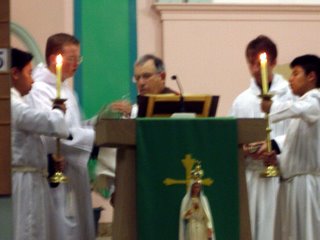
Here we are during the Gospel.
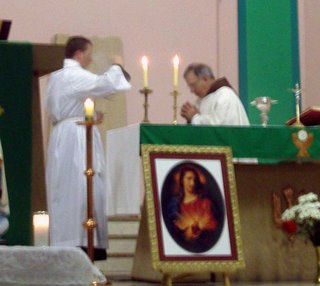
Here am I insensing the priest during the offertory.
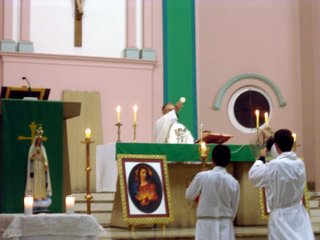
Here we are at elevation. Just makes you say "My lord my God" as St Thomas did.
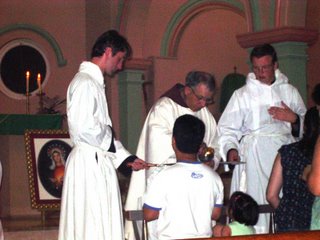
At the vigil we recive communion the traditional way but kneeling, on the tongue and with a commuinon plate.
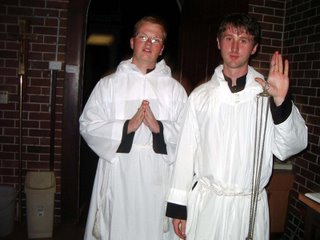
After the Mass we had a photo left so we decided to have one of those "pose" photos. So above is me and Jerard. Finally yes, we are serving with the full package of sutanne, amice, alb and cinture. Yes, it was hot but we offered it up.
All saints and All souls day
I love it when we do get permisson to celebrate missa cantata's during the week. It really makes my day to get from a school that has almost forgotten that it is Catholic, to hearing the awesome sounds of chant. Also I finally meet Tony aka Br Benedict (don't ask) and he gave me the best present I have gotten since my St Joseph's missal (Thanks again Nikolai)
Drum Roll
An authentic liber usualis from 1936. Trouble is that all of it is in Latin and I can only make sense of a few intructions and "rubrics". Now hopefully with the help of our local choir master, I can learn to sing without people running out of the room screaming.
Anyway I did take my camera along and took a few photos after the Mass. So here they are:

Above is the thrifer station in the sacristy after Mass.

And here is our sutanne and surplice cupboard. Why would I show you these pictures of the sacristy? Well I don't know. I was serving as MC so I could take photos during the Mass, so I thought I'd take photos of the sacristy.

